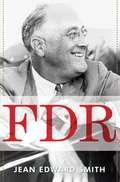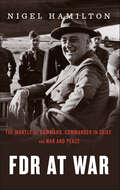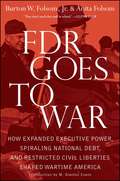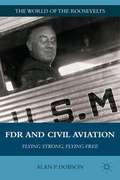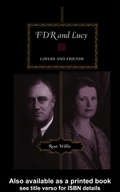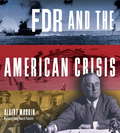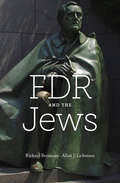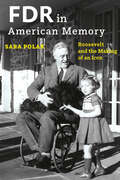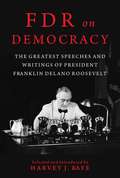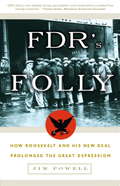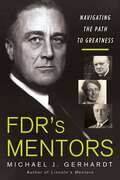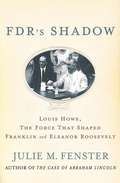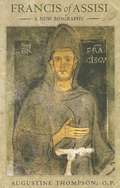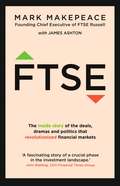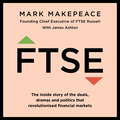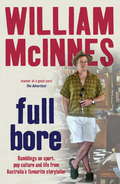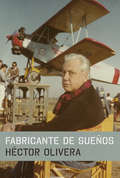- Table View
- List View
FDR
by Jean Edward SmithOne of today's premier biographers has written a modern, comprehensive, indeed ultimate book on the epic life of Franklin Delano Roosevelt. In this superlative volume, Jean Edward Smith combines contemporary scholarship and a broad range of primary source material to provide an engrossing narrative of one of America's greatest presidents. This is a portrait painted in broad strokes and fine details. We see how Roosevelt's restless energy, fierce intellect, personal magnetism, and ability to project effortless grace permitted him to master countless challenges throughout his life. Smith recounts FDR's battles with polio and physical disability, and how these experiences helped forge the resolve that FDR used to surmount the economic turmoil of the Great Depression and the wartime threat of totalitarianism. Here also is FDR's private life depicted with unprecedented candor and nuance, with close attention paid to the four women who molded his personality and helped to inform his worldview: His mother, Sara Delano Roosevelt, formidable yet ever supportive and tender; his wife, Eleanor, whose counsel and affection were instrumental to FDR's public and individual achievements; Lucy Mercer, the great romantic love of FDR's life; and Missy LeHand, FDR's longtime secretary, companion, and confidante, whose adoration of her boss was practically limitless. Smith also tackles head-on and in-depth the numerous failures and miscues of Roosevelt's public career, including his disastrous attempt to reconstruct the Judiciary; the shameful internment of Japanese-Americans; and Roosevelt's occasionally self-defeating Executive overreach. Additionally, Smith offers a sensitive and balanced assessment of Roosevelt's response to the Holocaust, noting its breakthroughs and shortcomings. Summing up Roosevelt's legacy, Jean Smith declares that FDR, more than any other individual, changed the relationship between the American people and their government. It was Roosevelt who revolutionized the art of campaigning and used the burgeoning mass media to garner public support and allay fears. But more important, Smith gives us the clearest picture yet of how this quintessential Knickerbocker aristocrat, a man who never had to depend on a paycheck, became the common man's president. The result is a powerful account that adds fresh perspectives and draws profound conclusions about a man whose story is widely known but far less well understood. Written for the general reader and scholars alike,FDRis a stunning biography in every way worthy of its subject. From the Hardcover edition.
FDR
by Jean Edward SmithOne of today's premier biographers has written a modern, comprehensive, indeed ultimate book on the epic life of Franklin Delano Roosevelt. In this superlative volume, Jean Edward Smith combines contemporary scholarship and a broad range of primary source material to provide an engrossing narrative of one of America's greatest presidents.This is a portrait painted in broad strokes and fine details. We see how Roosevelt's restless energy, fierce intellect, personal magnetism, and ability to project effortless grace permitted him to master countless challenges throughout his life. Smith recounts FDR's battles with polio and physical disability, and how these experiences helped forge the resolve that FDR used to surmount the economic turmoil of the Great Depression and the wartime threat of totalitarianism. Here also is FDR's private life depicted with unprecedented candor and nuance, with close attention paid to the four women who molded his personality and helped to inform his worldview: His mother, Sara Delano Roosevelt, formidable yet ever supportive and tender; his wife, Eleanor, whose counsel and affection were instrumental to FDR's public and individual achievements; Lucy Mercer, the great romantic love of FDR's life; and Missy LeHand, FDR's longtime secretary, companion, and confidante, whose adoration of her boss was practically limitless. Smith also tackles head-on and in-depth the numerous failures and miscues of Roosevelt's public career, including his disastrous attempt to reconstruct the Judiciary; the shameful internment of Japanese-Americans; and Roosevelt's occasionally self-defeating Executive overreach. Additionally, Smith offers a sensitive and balanced assessment of Roosevelt's response to the Holocaust, noting its breakthroughs and shortcomings.Summing up Roosevelt's legacy, Jean Smith declares that FDR, more than any other individual, changed the relationship between the American people and their government. It was Roosevelt who revolutionized the art of campaigning and used the burgeoning mass media to garner public support and allay fears. But more important, Smith gives us the clearest picture yet of how this quintessential Knickerbocker aristocrat, a man who never had to depend on a paycheck, became the common man's president. The result is a powerful account that adds fresh perspectives and draws profound conclusions about a man whose story is widely known but far less well understood. Written for the general reader and scholars alike, FDR is a stunning biography in every way worthy of its subject.From the Hardcover edition.
FDR At War: The Mantle of Command, Commander in Chief, and War and Peace (Fdr At War Ser. #3)
by Nigel HamiltonThe definitive biography of FDR’s leadership during WWII, presented here in a single volume—”splendid . . . the memoir Roosevelt didn’t get to write” (New York Times Book Review).This groundbreaking, three-volume study of President Roosevelt’s role as Commander in Chief tells the story of World War II from his perspective. Using hitherto unpublished documents and interviews, Hamilton rewrites the famous account of Allied strategy given by Winston Churchill in his memoirs. Hamilton reveals, close-up and in dramatic detail, Roosevelt’s mastery of strategy, his vision, and how he overcame resistance from Churchill and his own generals to set the course for victory. Mantle of Command, Commander in Chief, and War and Peace have been celebrated as “masterly” (The Wall Street Journal).“A first-class, lens-changing work.” —James N. Mattis, former US secretary of defense
FDR Goes to War
by Burton W. Folsom Anita FolsomFrom the acclaimed author of New Deal or Raw Deal?, called "eye-opening" by the National Review, comes a fascinating exposé of Franklin Delano Roosevelt's destructive wartime legacy--and its adverse impact on America's economic and foreign policies today. Did World War II really end the Great Depression--or did President Franklin Roosevelt's poor judgment and confused management leave Congress with a devastating fiscal mess after the final bomb was dropped? In this provocative new book, historians Burton W. Folsom, Jr., and Anita Folsom make a compelling case that FDR's presidency led to evasive and self-serving wartime policies. At a time when most Americans held isolationist sentiments--a backlash against the stunning carnage of World War I--Roosevelt secretly favored an aggressive interventionist foreign policy. Yet, throughout the 1930s, he spent lavishly on his disastrous New Deal programs and slashed defense spending, leaving America vastly unprepared for Japan's attack on Pearl Harbor and the challenge of fighting World War II. History books tell us the wartime economy was a boon, thanks to massive government spending. But the skyrocketing national debt, food rations, nonexistent luxuries, crippling taxes, labor strikes, and dangerous work of the time tell a different story--one that is hardly the stuff of recovery. Instead, the war ushered in a new era of imperialism for the executive branch. Roosevelt seized private property, conducted illegal wiretaps, tried to silence domestic opposition, and interned 110,000 Japanese Americans. He set a dangerous precedent for entangling alliances in foreign affairs, including his remarkable courtship of Russian dictator Joseph Stalin, while millions of Americans showed the courage, perseverance, and fortitude to make the weapons and fight the war. Was Roosevelt a great wartime leader, as historians almost unanimously assert? The Folsoms offer a thought-provoking revision of his controversial legacy. FDR Goes to War will make America take a second look at one of its most complicated presidents.
FDR and Civil Aviation
by Alan P. DobsonThe aim of this study is to demonstrate that Franklin D. Roosevelt was one of the leading agents in both setting out and working to implement the principles that came to govern the international aviation system from 1945 down to the recent present and that much of its design was drawn from the experience of domestic US aviation reform in the 1930s. In contemporary parlance one might say that what is proposed here is the explanation of the genesis of a roadmap set out successively by Roosevelt's administrations for the achievement of a liberalized and lightly regulated international civil aviation market. Furthermore, a key contention of this research is that FDR himself played a much more important role in crafting policy than has previously been acknowledged.
FDR and Lucy: Lovers and Friends
by Resa WillisFirst Published in 2005. Routledge is an imprint of Taylor & Francis, an informa company.
FDR and the American Crisis
by Albert MarrinThe definitive biography of president Franklin Delano Roosevelt for young adult readers, from National Book Award finalist Albert Marrin, is a must-have for anyone searching for President's Day reading. Brought up in a privileged family, Franklin Delano Roosevelt had every opportunity in front of him. As a young man, he found a path in politics and quickly began to move into the public eye. That ascent seemed impossible when he contracted polio and lost the use of his legs. But with a will of steel he fought the disease—and public perception of his disability—to become president of the United States of America. FDR used that same will to guide his country through a crippling depression and a horrendous world war. He understood Adolf Hitler, and what it would take to stop him, before almost any other world leader did. But to accomplish his greater goals, he made difficult choices that sometimes compromised the ideals of fairness and justice. FDR is one of America&’s most intriguing presidents, lionized by some and villainized by others. National Book Award finalist Albert Marrin explores the life of a fascinating, complex man, who was ultimately one of the greatest leaders our country has known.
FDR and the Jews
by Richard Breitman Allan J. LichtmanA contentious debate lingers over whether Franklin Delano Roosevelt turned his back on the Jews of Hitler’s Europe. FDR and the Jews reveals a concerned leader whose efforts on behalf of Jews were far greater than those of any other world figure but whose moral leadership was tempered by the political realities of depression and war.
FDR and the Spanish Civil War: Neutrality and Commitment in the Struggle that Divided America
by Dominic TierneyWhat was the relationship between President Franklin D. Roosevelt, architect of America's rise to global power, and the 1936-39 Spanish Civil War, which inspired passion and sacrifice, and shaped the road to world war? While many historians have portrayed the Spanish Civil War as one of Roosevelt's most isolationist episodes, Dominic Tierney argues that it marked the president's first attempt to challenge fascist aggression in Europe. Drawing on newly discovered archival documents, Tierney describes the evolution of Roosevelt's thinking about the Spanish Civil War in relation to America's broader geopolitical interests, as well as the fierce controversy in the United States over Spanish policy. Between 1936 and 1939, Roosevelt's perceptions of the Spanish Civil War were transformed. Initially indifferent toward which side won, FDR became an increasingly committed supporter of the leftist government. He believed that German and Italian intervention in Spain was part of a broader program of fascist aggression, and he worried that the Spanish Civil War would inspire fascist revolutions in Latin America. In response, Roosevelt tried to send food to Spain as well as illegal covert aid to the Spanish government, and to mediate a compromise solution to the civil war. However unsuccessful these initiatives proved in the end, they represented an important stage in Roosevelt's emerging strategy to aid democracy in Europe.
FDR in American Memory: Roosevelt and the Making of an Icon
by Sara PolakHow was FDR's image constructed—by himself and others—as such a powerful icon in American memory?In polls of historians and political scientists, Franklin Delano Roosevelt consistently ranks among the top three American presidents. Roosevelt enjoyed an enormous political and cultural reach, one that stretched past his presidency and across the world. A grand narrative of Roosevelt's crucial role in the twentieth century persists: the notion that American ideology, embodied by FDR, overcame the Depression and won World War II, while fascism, communism, and imperialism—and their ignoble figureheads—fought one another to death in Europe. This grand narrative is flawed and problematic, legitimizing the United States's cultural, diplomatic, and military role in the world order, but it has meant that FDR continues to loom large in American culture.In FDR in American Memory, Sara Polak analyzes Roosevelt's construction as a cultural icon in American memory from two perspectives. First, she examines him as a historical leader, one who carefully and intentionally built his public image. Focusing on FDR's use of media and his negotiation of the world as a disabled person, she shows how he consistently aligned himself with modernity and future-proof narratives and modes of rhetoric. Second, Polak looks at portrayals and negotiations of the FDR icon in cultural memory from the vantage point of the early twenty-first century. Drawing on recent and well-known cultural artifacts—including novels, movies, documentaries, popular biographies, museums, and memorials—she demonstrates how FDR positioned himself as a rhetorically modern and powerful but ideologically almost empty container. That deliberate positioning, Polak writes, continues to allow almost any narrative to adopt him as a relevant historical example even now.As a study of presidential image-fashioning, FDR in American Memory will be of immediate relevance to present-day readers.
FDR on Democracy: The Greatest Speeches and Writings of President Franklin Delano Roosevelt
by Harvey J. KayeFrom One of the Greatest Leaders in American History, a Collection of the Words and Writings that Inspired a Generation of Americans to Become the Greatest Generation In just under three decades of public life, Franklin Delano Roosevelt rose to become one of the greatest orators and leaders in American history. As the longest-serving US president, he guided the nation through two of the greatest challenges of the twentieth century—the Great Depression of the 1930s and the Fascist threat of the 1940s—and radically transformed American public life. In doing so, FDR created the conditions that enabled Americans to make the United States stronger, more prosperous, and more democratic than ever before for generations to come. Through his words—selected, annotated, and introduced here by writer and scholar Harvey J. Kaye—we rediscover the liberal and social-democratic vision and promise that FDR articulated so powerfully. We recall Roosevelt's efforts to redeem the challenge of the Declaration of Independence and renew the promise of equality and life, liberty, and the pursuit of happiness. We see him empower working people and make life more secure for more Americans. And we are reminded of his desire to not simply win the Second World War, but to create a nation and a world committed to the realization of the Four Freedoms—freedom of speech and worship, freedom from want and fear—indeed, to enact here in the United States a Second Bill of Rights, an Economic Bill of Rights for all Americans. In this collection of his greatest writings and speeches, we encounter the words that inspired and encouraged Americans to remember who they were and what they were capable of accomplishing—the words that helped turn a generation of Americans into the Greatest Generation. Now more than ever, we need to recall FDR's words. Now, when FDR's democratic legacy—the legacy of a generation—is under siege, we need to remind ourselves of who we are and what we need to do to make America freer, more equal, and more democratic.
FDR's Ambassadors and the Diplomacy of Crisis
by David MayersWhat effect did personality and circumstance have on US foreign policy during World War II? This incisive account of US envoys residing in the major belligerent countries - Japan, Germany, Italy, China, France, Great Britain, USSR - highlights the fascinating role played by such diplomats as Joseph Grew, William Dodd, William Bullitt, Joseph Kennedy and W. Averell Harriman. Between Hitler's 1933 ascent to power and the 1945 bombing of Nagasaki, US ambassadors sculpted formal policy - occasionally deliberately, other times inadvertently - giving shape and meaning not always intended by Franklin D. Roosevelt or predicted by his principal advisors. From appeasement to the Holocaust and the onset of the Cold War, David Mayers examines the complicated interaction between policy, as conceived in Washington, and implementation on the ground in Europe and Asia. By so doing, he also sheds needed light on the fragility, ambiguities and enduring urgency of diplomacy and its crucial function in international politics.
FDR's Folly: How Roosevelt and His New Deal Prolonged the Great Depression
by Jim PowellThe Great Depression and the New Deal. For generations, the collective American consciousness has believed that the former ruined the country and the latter saved it. Endless praise has been heaped upon President Franklin Delano Roosevelt for masterfully reining in the Depression&’s destructive effects and propping up the country on his New Deal platform. In fact, FDR has achieved mythical status in American history and is considered to be, along with Washington, Jefferson, and Lincoln, one of the greatest presidents of all time. But would the Great Depression have been so catastrophic had the New Deal never been implemented?In FDR&’s Folly, historian Jim Powell argues that it was in fact the New Deal itself, with its shortsighted programs, that deepened the Great Depression, swelled the federal government, and prevented the country from turning around quickly. You&’ll discover in alarming detail how FDR&’s federal programs hurt America more than helped it, with effects we still feel today, including:• How Social Security actually increased unemployment• How higher taxes undermined good businesses• How new labor laws threw people out of work• And much moreThis groundbreaking book pulls back the shroud of awe and the cloak of time enveloping FDR to prove convincingly how flawed his economic policies actually were, despite his good intentions and the astounding intellect of his circle of advisers. In today&’s turbulent domestic and global environment, eerily similar to that of the 1930s, it&’s more important than ever before to uncover and understand the truth of our history, lest we be doomed to repeat it.
FDR's Mentors: Navigating the Path to Greatness
by Michael J. GerhardtA unique and illuminating exploration of the key relationships that shaped Franklin Delano Roosevelt into one of America&’s most definitive leaders and impacted his influence on the world stage, from presidential historian Michael J. Gerhardt, the acclaimed author of Lincoln&’s Mentors and principal adviser in the official annotation of the Constitution at the Library of Congress. Franklin Delano Roosevelt wasn&’t a born leader. He became one. As a boy he was in poor health, was insecure, and an average student at best. Growing into manhood, the lessons he learned came not from books but from influencers of his lifetime, beginning with Endicott Peabody, the most renowned US headmaster of the twentieth century. He instilled in Roosevelt a confidence and strength that empowered the young student and propelled him to greatness as one of the most revered presidents of the United States. For Roosevelt, Peabody was only one of a small number of people who helped him develop the skills and temperament that enabled him to overcome the devastating effects of polio, to lead the nation through two crises, and to secure America&’s leadership in the world. In FDR&’s Mentors, Michael Gerhardt tells the extraordinary stories of the men and women who had a vital impact on Roosevelt&’s life, career, and pragmatic personality: his distant cousin Teddy; his wife Eleanor; President Woodrow Wilson; journalist Lewis Howe; Winston Churchill; and New York Democratic Party leader Al Smith. Form the creation of the New Deal through Roosevelt&’s war with the Supreme Court to the attack on Pearl Harbor, Roosevelt persevered with never-ending grit, grace, limitless optimistism, and patience. It is thanks to the invaluable personal connections, inspiration, and wisdom of those who shaped and informed FDR&’s historic presidency—one that has become a model of resilience and, in turn, an influence on every president who has followed in his path.
FDR's Shadow: Louis Howe, the Force That Shaped Franklin and Eleanor Roosevelt
by Julie M. Fenster"FDR's Shadow" is a brilliant look at how the indomitable and enlightened Louis Howe became the mega-advisor of the Roosevelt Clan. A must read for anybody interested in U. S. political history. --Douglas Brinkley, author of "The Wilderness Warrior. "
FDR's Splendid Deception
by Hugh Gregory GallagherFocuses on FDR's disability and the lengths gone to to conceal it from the world.
FOB Doc
by Ray WissMilitary doctors serving in Afghanistan usually spend their entire tour in the relatively safe confines of the main base. FOB Doc is the story of one Canadian doctor who spent nearly his entire tour in combat. Captain Ray Wiss was stationed at Forward Operating Bases - FOBs - in Khandahar province, the birthplace of the Taliban and the most intense zone combat in Afghanistan. He shares the 'terror and boredom' of the front-line soldier's life in this candid personal diary. One day, he might be participating in combat operations, treating severe and bloody injuries and coping with the deaths of fellow soldiers, both Afghans and NATO allies; another day, he might be writing about the challenges of going to the latrine in sub-zero weather. FOB Doc is heartbreaking and hilarious, often on the same page.
FRANCIS of ASSISI
by Augustine ThompsonAmong the most beloved saints in the Catholic tradition, Francis of Assisi (c. 1181–1226) is popularly remembered for his dedication to poverty, his love of animals and nature, and his desire to follow perfectly the teachings and example of Christ. During his lifetime and after his death, followers collected, for their own purposes, numerous stories, anecdotes, and reports about Francis. As a result, the man himself and his own concerns became lost in legend. In this authoritative and engaging new biography, Augustine Thompson, O. P. , sifts through the surviving evidence for the life of Francis using modern historical methods. The result is a complex yet sympathetic portrait of the man and the saint. Francis emerges from this account as very much a typical thirteenth-century Italian layman, but one who, when faced with unexpected crises in his personal life, made decisions so radical that they challenge his own society-and ours. Unlike the saint of legend, this Francis never had a unique divine inspiration to provide him with rules for following the teachings of Jesus. Rather, he spent his life reacting to unexpected challenges, before which he often found himself unprepared and uncertain. The Francis who emerges here is both more complex and more conflicted than that of older biographies. His famed devotion to poverty is found to be more nuanced than expected, perhaps not even his principal spiritual concern. Thompson revisits events small and large in Francis's life, including his troubled relations with his father, his contacts with Clare of Assisi, his encounter with the Muslim sultan, and his receiving the Stigmata, to uncover the man behind the legends and popular images. A tour de force of historical research and biographical writing, Francis of Assisi: A New Biography is divided into two complementary parts-a stand alone biographical narrative and a close, annotated examination of the historical sources about Francis. Taken together, the narrative and the survey of the sources provide a much-needed fresh perspective on this iconic figure. "As I have worked on this biography," Thompson writes, "my respect for Francis and his vision has increased, and I hope that this book will speak to modern people, believers and unbelievers alike, and that the Francis I have come to know will have something to say to them today. "
FTSE: The inside story of the deals, dramas and politics that revolutionized financial markets
by Mark Makepeace James Ashton'An inspiring success story.' Baroness Rona Fairhead, CBEA RINGSIDE SEAT ON SOME OF THE BIGGEST DEALS AND BIGGEST PERSONALITIES IN BUSINESS AND GLOBAL POLITICS.They are just four letters on an electronic ticker tape, but FTSE has become a byword for money, power, influence and - crucially, after numerous financial crises - trust. How this organisation, FTSE International, brought order to the financial system over several decades, is a story of how capitalism globalized and a data revolution transformed the investment industry. It is a story of how a team of innovators seized an opportunity to build a business that today leads its field and guides the fortunes of an astonishing $16 trillion of funds. It is a story that Mark Makepeace, founding Chief Executive of FTSE International, knows better than anybody.FTSE is a ringside seat on some of the biggest deals and biggest personalities in business and global politics, chronicling how the FTSE 100 was born, behind-the-scenes rows with chief executives of some of the world's largest companies, political in-fighting, diplomatic incidents, and the ferocious dealmaking that followed over 35 years of market boom and bust. 'FTSE is a story which should inform and fascinate anyone interested in capital markets.' Sir Donald Brydon, CBE
FTSE: The inside story of the deals, dramas and politics that revolutionized financial markets
by Mark Makepeace James AshtonA RINGSIDE SEAT ON SOME OF THE BIGGEST DEALS AND BIGGEST PERSONALITIES IN BUSINESS AND GLOBAL POLITICS.FTSE is an account of how a small start-up created by the Financial Times and the London Stock Exchange launched in the mid 1980s to provide financial information, became a world leader and one of the UK's most trusted and famous brands. It chronicles how the FTSE 100 was born and details the ferocious dealmaking that followed over 35 years of market boom and bust. It provides a ringside seat on some of the biggest deals and biggest personalities in business and global politics. There have been behind-the-scenes rows with chief executives of some of the world's largest companies, political in-fighting, diplomatic incidents, and even controversy over a pioneering push into responsible investing that began life as a conversation with James Bond actor Roger Moore.FTSE is a modern British brand recognised the world over, like the Royal Family, the BBC or Sir Richard Branson's Virgin empire. They are just four letters on an electronic ticker tape, but FTSE has become a byword for money, power, influence and - crucially after numerous financial crises - trust. How this organisation, FTSE International, brought order to the financial system over several decades is a story of how capitalism globalised and a data revolution transformed the investment industry. It is a story of how a team of British innovators seized an opportunity to build a business that today leads its field and guides the fortunes of an astonishing $16 trillion of funds. It is a story that Mark Makepeace, as the founding Chief Executive of FTSE International, knows better than anybody.(P) 2020 Hodder & Stoughton Ltd
FULL BORE
by William McinnesWilliam McInnes, one of Australia's best-loved entertainers and authors, takes a look at the Aussie obsession with sports and pop culture.A chance encounter in an auction house is the jumping-off point for William's inimitable take on our sport-obsessed nation, Australian popular culture and the artefacts and memorabilia that both make us cringe with recognition and laugh with warm affection. His trademark humour and anecdotes litter this collection, making it a true delight.'insightful, understated and very funny' Sydney Morning Herald on The Laughing Clowns'William McInnes compels with the sheer delightfulness of his memoir, and with his fine ability to spin a damn funny yarn' Sunday Telegraph on A Man's Got To Have A Hobby'a ripper' The Canberra Times on The Making of Modern Australia
Fabre, Poet of Science
by Bernard Miall Georges Victor LegrosFabre studied insects, taught about insects, and wrote prolifically about insects. His writing is beautiful and descriptive. He is author of "The Life of the Spider."
Fabricante de sueños
by Héctor OliveraVida y obra de uno de los productores y directores más importantes y prolíficos del cine argentino, contada por él mismo con lucidez, gracia, convicción y sensibilidad en un relato que entrevera su pasión por el cine, el devenir político de la Argentina a lo largo de casi noventa años y un irresistible conjunto de anécdotas personales que incluyen grandes revelaciones sobre su vida íntima y amorosa. Es imposible pensar el cine argentino sin Héctor Olivera. Protagonista de una vida que vale por varias, a sus casi noventa años se detiene un momento para recordar el largo camino transitado. Pródigo en anécdotas su relato comprende, entre otras historias, la de las más de cien películas que hizo como director o como productor bajo el sello Aries, empresa fundamental del cine argentino, que creó con su socio y amigo Fernando Ayala. En sus films -que capturaron el espíritu de su época, en ocasiones desafiando una violenta censura-, Olivera adaptó obras de Borges, Soriano, Bayer, Cossa y Viñas, entre otros; enriquecidas por actores como Federico Luppi, Pepe Soriano, Héctor Alterio, Luis Brandoni, Oscar Martínez, Norman Briski; actrices como Mirtha Legrand, Norma Aleandro, Thelma Biral, Cecilia Roth, Susana Giménez, y cómicos de la talla de Sandrini, Olmedo y Porcel. Al mismo tiempo, recorre el siglo XX argentino, haciendo eje en el peronismo con una honesta y personal combinación de rechazo y fascinación por la figura de su líder. En el encuentro de estos recorridos toma forma una biografía que Olivera despliega con gracia, sensibilidad y el espíritu vibrante que marcó cada uno de sus proyectos.
